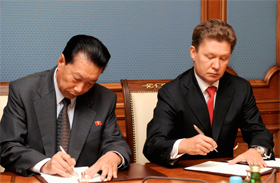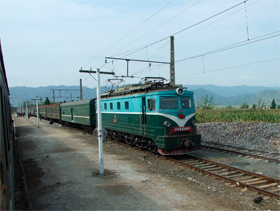Currently, Russia has come to realize that a resolute turn to East Asia is a necessary means to both give impetus to economic modernization of its Far Eastern areas and strengthen its international positions. For these tasks to be a success, coordinating prospective planning with that of East Asian countries is a vital precondition. In this regard, worthy of attention is the gas pipeline from Russia to the Republic of Korea via the territory of DPRK. What factors are at present determining Russia’s renewed interest in the pipeline? And what strategic traps – if any – can Russia fall into in case the project is implemented?
For Russia, this issue is not new – it has been addressed in some way or another since the beginning of the 1990s. Various options concerning sources of gas supply, routes of transportation etc. have been explored. Simultaneously, the project has been a focus of special interest among Russian experts [1]. With these factors in mind, an attempt to analyze the project in Russia’s priorities, both current and future, seems to be a timely exercise.
Opportune moment
Simultaneously with Russia’s push eastward, preconditions for implementing the gas pipeline project are maturing. Several points bear relevance.
First, its infrastructural basis is at a high level of readiness. The pipeline is supposed to stem from the gas transmission system Sakhalin-Khabarovsk-Vladivostok which was commissioned in September 2011. According to Russian media, Alexey Miller, head of Gazprom, made it clear that Russia has done its job regarding infrastructural preparedness to launch the pipeline to South Korea [2].
Second, Russia realizes that it has to diversify its energy policy. So far, Russian energy export has primarily been focused on Europe which is in severe economic hardship. Consequently, prospects for cooperation are unclear. By contrast, Asia-Pacific energy markets are expanding. In South Korean connection, it is worth pointing out that from 2001 to 2011 its gas consumption increased more than twofold – from 20.8 to 46.6 billion cubic meters [3]. In future, gas deliveries from Russia to South Korea are likely to intensify owing to a short distance and a surge of instability systematically occurring in Middle East which accounts for approximately 44,5% of South Korean gas import. Simultaneously, Moscow hopes that a more active dialogue on energy will add extra impetus towards cooperation with Seoul in other sectors, including technologically advanced industries.
Third, it is timely for political reasons. Russia’s intention to integrate more closely in Asia-Pacific has been repeatedly voiced at the highest level. Huge money has been poured into preparations for APEC Summit-2012 in Vladivostok. Creating new bureaucratic bodies with supreme authorities is on the way. In other words, the Pacific direction of Russian policy is de-facto strengthening and Northeast Asia, which embraces the strongest regional economies, is likely to be its central pillar. On this direction, the key priority for Russia is joining multilateral cooperation rather than implementing only bilateral projects. To this end, Russia realizes an enormous contribution South Korea, an active participant of regional multilateral cooperation, can make in approaching to this task.
Another reason is that Russia needs economically vibrant and politically stable East Asia in order to succeed in economic modernization of its Far East. The more so since after hosting the APEC Summit-2012, Vladivostok may well await the fate of a megacity and a regional infrastructural and economic hub 4. In this context, Russia’s interests are best served in case a predictable regional milieu adjacent to Vladivostok is created. The gas pipeline construction, as well as other two trilateral infrastructure projects, is perfectly suited to this task.
Last but not least, these projects may help significantly improve Russia’s image as a regional peacemaker which actively and effectively contributes to maintaining stability in Northeast Asia. With Russia’s turn eastward, this image can undoubtedly be an important strategic asset.
In sum, it is fair to conclude that from Russia’s perspective timing for the gas pipeline construction is opportune, and by its implementation Moscow can receive a number of tangible benefits.
Strengths and weaknesses
Russia’s position regarding the gas pipeline construction has both strong and weak points. The former relate to technical aspects while the latter – to the political side.
On the technical front, setbacks are unlikely. The necessary infrastructure is at a high level of readiness. Also, according to information from Gazprom, Russia is well prepared to flexibly regulate all concomitant technical problems in dialogue with North Korea [5]. If so, incentives for Pyongyang to be part of the project will become even stronger than they currently are.
In the political realm, the situation is somewhat different as several obstacles are in the path.
The key is absence of legal framework for this project as Russia and North Korea don’t have any agreement on gas cooperation. With this in view, all current planning is no more than wishful thinking rather than concrete and goal-oriented steps waiting to be taken as soon as commercial terms are agreed on.
Also, prospects for creating a trilateral institutional framework to flexibly and timely deal with myriads of rising questions are poor. For instance, a point which needs specifying is at what place at the Demilitarized Zone (DMZ) the gas will be transferred to South Korea. With a course of time, other questions will inevitably appear. To this end, for the project to be a success, coordinated trilateral actions will be absolutely necessary. At the same time, however, the generally accepted international practice of creating a trilateral consortium doesn’t seem to be realistic as North Korean economy has only the state ownership.
Third and most important, Russia cannot provide its South Korean counterparts with reliable guarantees of safe delivery. Given that both Russian Government and Gazprom lack real influence on North Korean leadership, Moscow and Seoul are bound to rely upon Pyongyang’s good will and be hostages to myriads of circumstances stemming from its unpredictability.
These obstacles are too serious to assume that the project will be performed smoothly even under the most favorable scenario. A high level of its politicization will be another complicating factor.
Between short-term and long-term prospective planning: the gas pipeline connection
As it can be seen, the political side of the project is fraught with serious problems. Russia is and will probably remain ready to take efforts to circumvent them in some or another way. Ironically, however, in case of success Russia is very likely to run into even a bigger headache. While performing a broader task – to harmonize its prospective planning with that of its Korean partners – Russia can fall into a strategic trap encountering a contradiction between its short-term and long-term priorities.
In short-term perspective, interests of the three parties will be in harmony. Russia will enhance its role in both strengthening energy security of South Korea and mitigating tensions on the peninsula. Apart from it, plans to more closely cooperate with its Northeast Asian neighbors, diversify energy outlets and get image bonuses will become a reality. South Korea’s expected benefits are no less clear – suffice it to say that it can buy gas 30 percent below its current market price simultaneously reducing the distance of its delivery, to mention just a few points. North Korea will not lose either – gas transit is both a good means to have stable currency revenues – $100 million per annum – and an effective counter-measure against an eye-catching economic overdependence on China. Another motivating factor for Pyongyang is that this money will come directly to its elite rather than as investments in North Korean economy. In other words – a classic win-win situation, each party will be satisfied.
But a longer-term outlook may break this idyll. The situation cannot remain stagnant and it will require making further steps. The most obvious is to accelerate implementing other trilateral projects – the connection of Trans-Korean and the Trans-Siberian railways and the transfer of power transmission lines between Russia and South Korea. With a course of time, other projects will inevitably come to the forefront of Moscow’s and Seoul’s priorities. That is not to say that Russia’s possible joining multilateral projects in Northeast Asia simultaneously with speeding up economic cooperation between China, Japan and the Republic of Korea will no less inevitably have direct relevance to Pyongyang forcing it to be more open to dialogue with Moscow and Seoul. At this juncture, success will depend solely on DPRK willingness to become a reliable partner and responsible member of international community.
But whether North Korean leadership will be ready to embrace this scenario appears doubtful. Recent trends demonstrated its low readiness to initiate large-scale reforms and negotiate on issues of common concern. To this end, for Pyongyang a temptation to receive money sparing no effort and periodically raise transit fees at its own discretion may be too strong to resist.
This line is highly likely to be in direct contradiction with key priorities of Moscow and Seoul. Consequently, in the long-term for Russia to coordinate its prospective planning with that of its both partners on the peninsula will be increasingly difficult.
Conclusion
To Russia, the gas pipeline construction to South Korea via the territory of North Korea is advantageous in many respects. Moscow is ready to start its part of the project according to its schedule as the political consent at the highest level has been obtained.
But a broader task approached by Russia– to harmonize its prospective planning with that of its Korean partners – may fall into a strategic trap. While in short-term interests of the three participating parties may be in harmony, with a lapse of time contradictions between the key priorities of Russia and South Korea on the one part and North Korea on the other will be growing.
In this connection, it is in Russia’s best interests to realize that the key factor for success will not be additional incentives and concessions offered to Pyongyang. It will be willingness of North Korean leadership to become a reliable partner, which cannot be done without large-scale domestic changes. It is the degree of this willingness that in the future will exert the strongest influence upon all planned trilateral undertakings, including the gas pipeline construction.
1. See, for instance: Воронцов А. Газовая стратегия России в Восточной Азии и Корее. Новое восточное обозрение. 21.12.2011. (Vorontsov A. Russia’s Gas Strategy in East Asia and Korea. New Asian Outlook. 21.12.2011.)
2. "Газпром" дотянулся до Южной Кореи. Коммерсантъ. 16.09.2011. (“Gazprom” Has Reached South Korea. Kommersant. 16.09.2011.)
3. BP Statistical Review of World Energy. June 2012. – P. 23.
4. Currently, this scenario is being carefully scrutinized by Russian and foreign experts. See: Russia’s Interests in the Context of Asia-Pacific Region Security and Development. Report/RIAC,RSC APEC. – Moscow, Izdatelstvo Prospect, 2012
5. “Гарантией станет заинтересованность Пхеньяна и Сеула в успехе проекта”. Коммерсантъ. 30.11.2011. (“Guarantees for the Project Will Be Provided by Pyongyang’s and Seoul’s Interest in Its Success.” Kommersant. 30.11.2011.)


.jpg)




